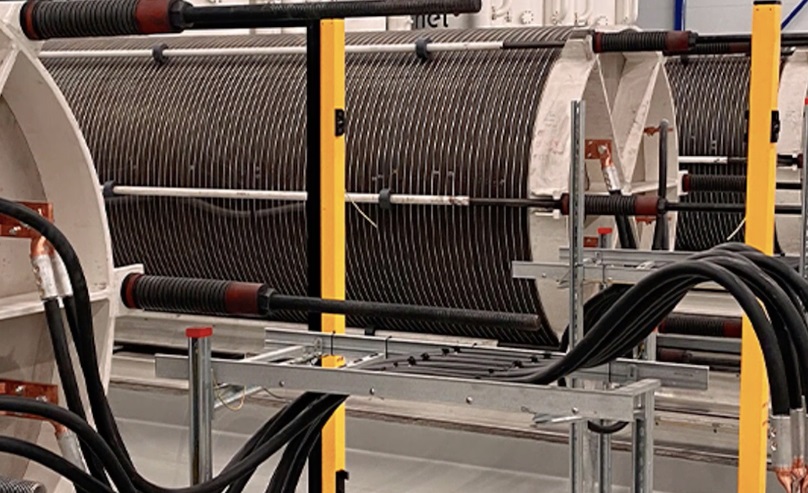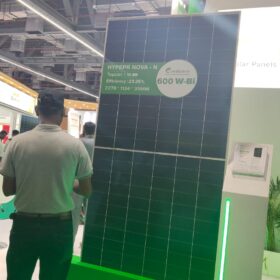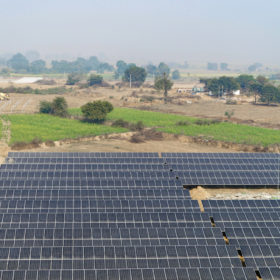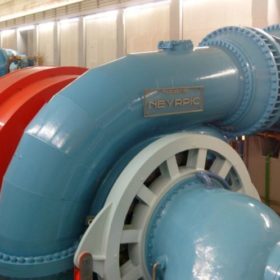Hitachi Energy has supplied Ovako with a modular eHouse solution for the electrification of a 20 MW electrolyzer in Hofors, Sweden. The project marks the world’s first steel plant to use hydrogen for heating before the rolling process. Beyond steel heating, the hydrogen will fuel cell-powered trucks, and surplus heat from the plant will support district heating. Hitachi Energy’s delivery includes a modular Grid-to-Stack solution, with components such as transformers, rectifiers, control equipment, and high-current connections to convert alternating current from the distribution grid into the direct current required for the electrolyzer. The company has collaborated on the system’s development with Volvo Group, H2 Green Steel, and Nel Hydrogen.
Enapter has expanded its product lineup with the introduction of the “AEM Flex 120,” a new AEM electrolyzer for industrial and refueling pilot projects. The AEM Flex 120 features up to 50 AEM Stack core modules, ensuring high reactivity to fluctuating renewable energy sources. It can produce approximately 53 kg of hydrogen per day at 99.999 percent purity, with the option for a dryer. This electrolyzer addresses the market gap between Enapter’s AEM Electrolyser EL 4 (1 kg/day) and its megawatt-scale AEM Multicore (450 kg/day), and the company is scaling up its production capacities to meet demand.
The Port of Rotterdam and the inland Port of Duisburg have jointly presented the findings of a feasibility study focused on North Rhine-Westphalia, Germany. The results show a significant local increase in demand for low-carbon hydrogen, exceeding 3 million tons per year until 2045. To meet this growing demand for green hydrogen in the medium term, the study recommends completing the first hydrogen pipeline between the two ports by 2027. Subsequently, pipelines for hydrogen derivatives and CO2 export should follow, complementing the essential roles of inland shipping and rail transport.
Rina, in collaboration with SEA Aeroporti di Milano and the local branch of the Italian enterprises federation Confindustria, has launched the Hydrogen Valley Malpensa project – Italy’s first hydrogen valley in an airport environment. The project’s objective is to establish a complete hydrogen supply chain ecosystem by September 2027. Participants in the project include Air Pullman, Artelys, Circe, Emisia, and Lhyfe Labs, making it a collaborative effort involving various stakeholders.
Nuvera Fuel Cells has agreed to supply a hydrogen fuel cell system for a reachstacker developed by Hyster, which has been delivered to the Port of Valencia in Spain as part of the H2Ports project. This initiative aims to introduce hydrogen-powered vehicles and equipment into port operations. “The hydrogen is stored in high-pressure tanks and can be refilled less than 15 minutes,” said Nuvera Fuel Cells. “The hydrogen fuel cell charges the batteries, which power the electric motors and hydraulic systems, enabling the reachstacker to lift laden containers with comparable performance to a diesel alternative.”
Irish Rail and Digas have signed a contract for a proof-of-concept project to convert a diesel locomotive from traditional diesel fuel to hydrogen. As part of this €1.5 million project, Irish Rail will provide the 071 Class Diesel Locomotive for the conversion, while Digas will manufacture and install a Hydrogen Internal Combustion Engine (H2 ICE). The project’s success could demonstrate a practical and cost-effective means to decarbonize and operate existing diesel locomotives with hydrogen-powered engines, offering environmental benefits for rail transportation.
This content is protected by copyright and may not be reused. If you want to cooperate with us and would like to reuse some of our content, please contact: editors@pv-magazine.com.








By submitting this form you agree to pv magazine using your data for the purposes of publishing your comment.
Your personal data will only be disclosed or otherwise transmitted to third parties for the purposes of spam filtering or if this is necessary for technical maintenance of the website. Any other transfer to third parties will not take place unless this is justified on the basis of applicable data protection regulations or if pv magazine is legally obliged to do so.
You may revoke this consent at any time with effect for the future, in which case your personal data will be deleted immediately. Otherwise, your data will be deleted if pv magazine has processed your request or the purpose of data storage is fulfilled.
Further information on data privacy can be found in our Data Protection Policy.